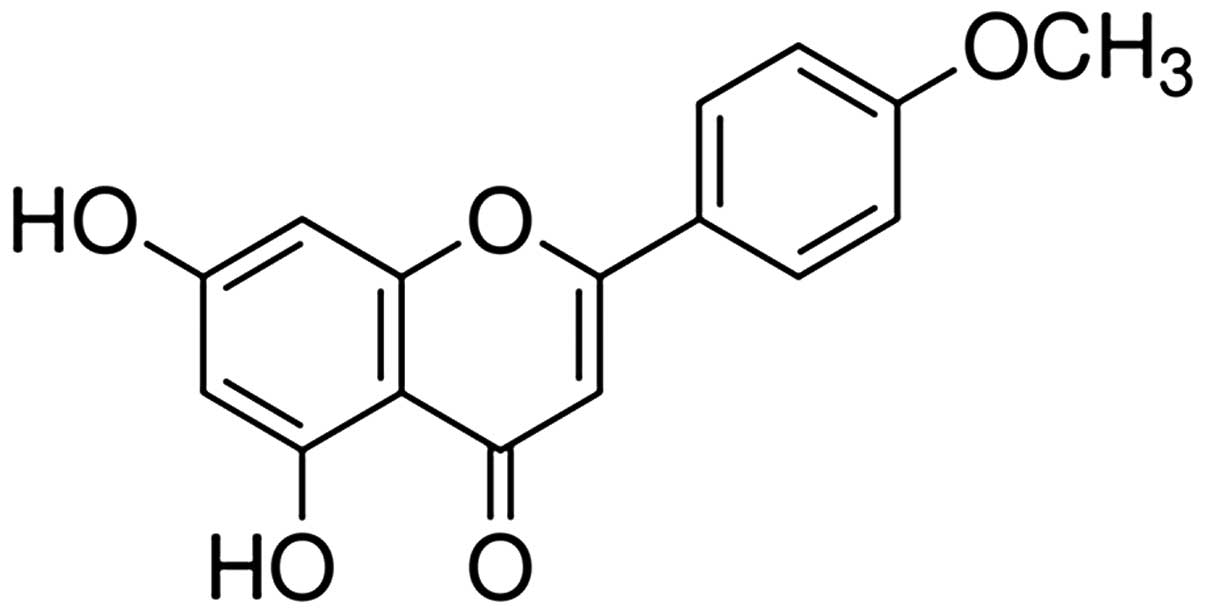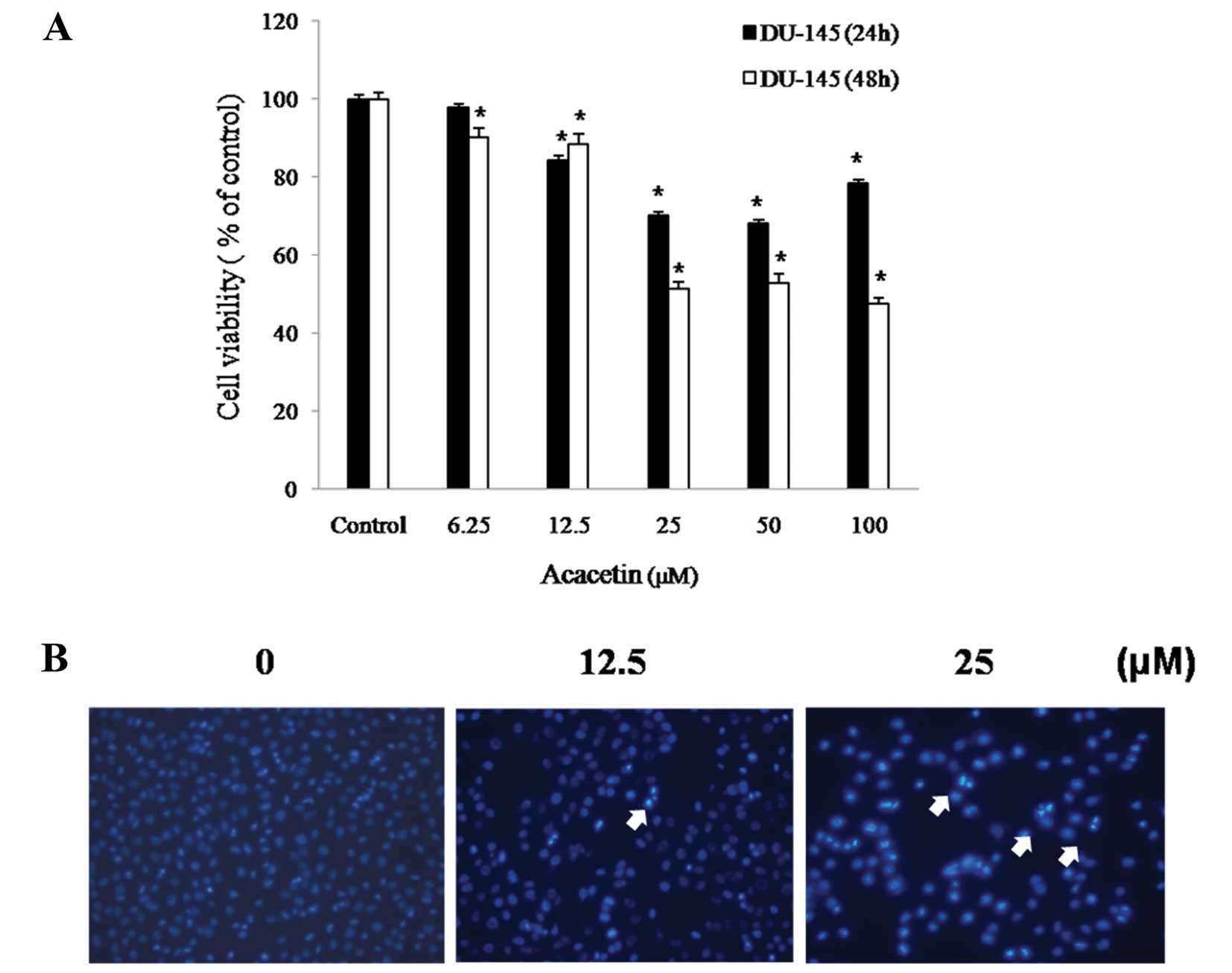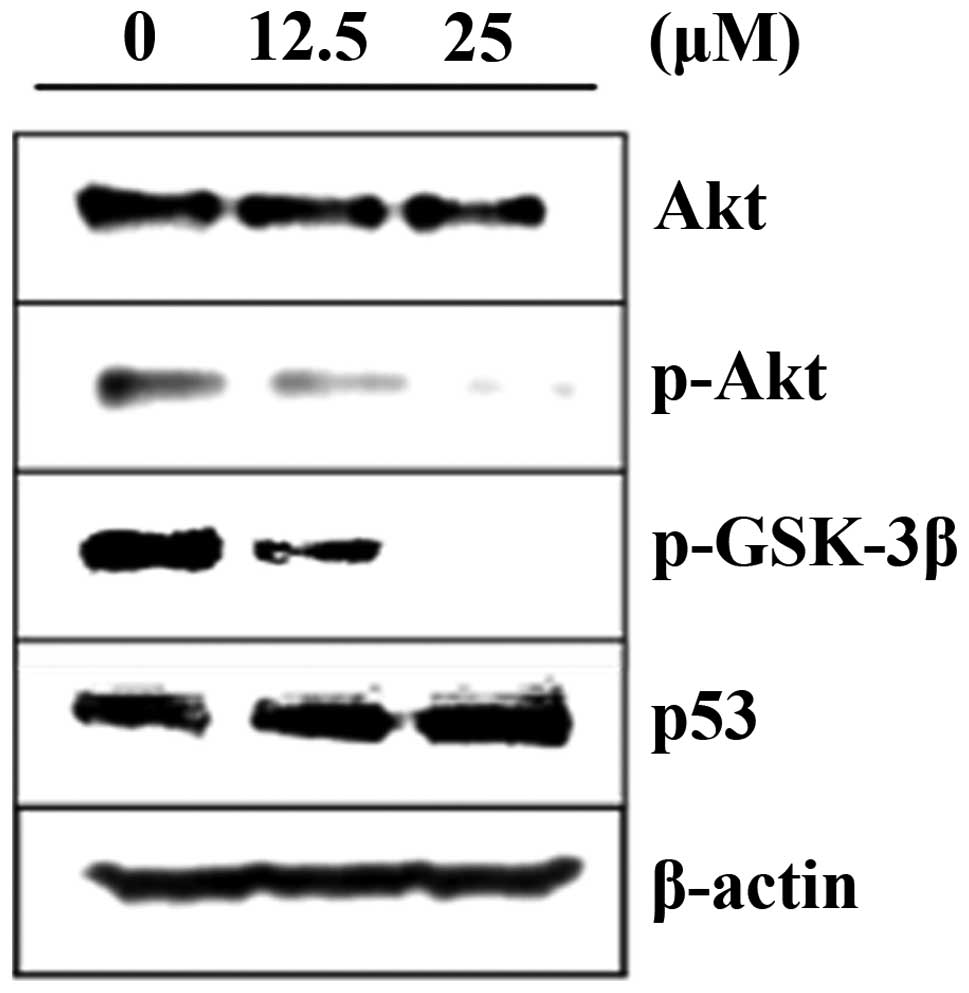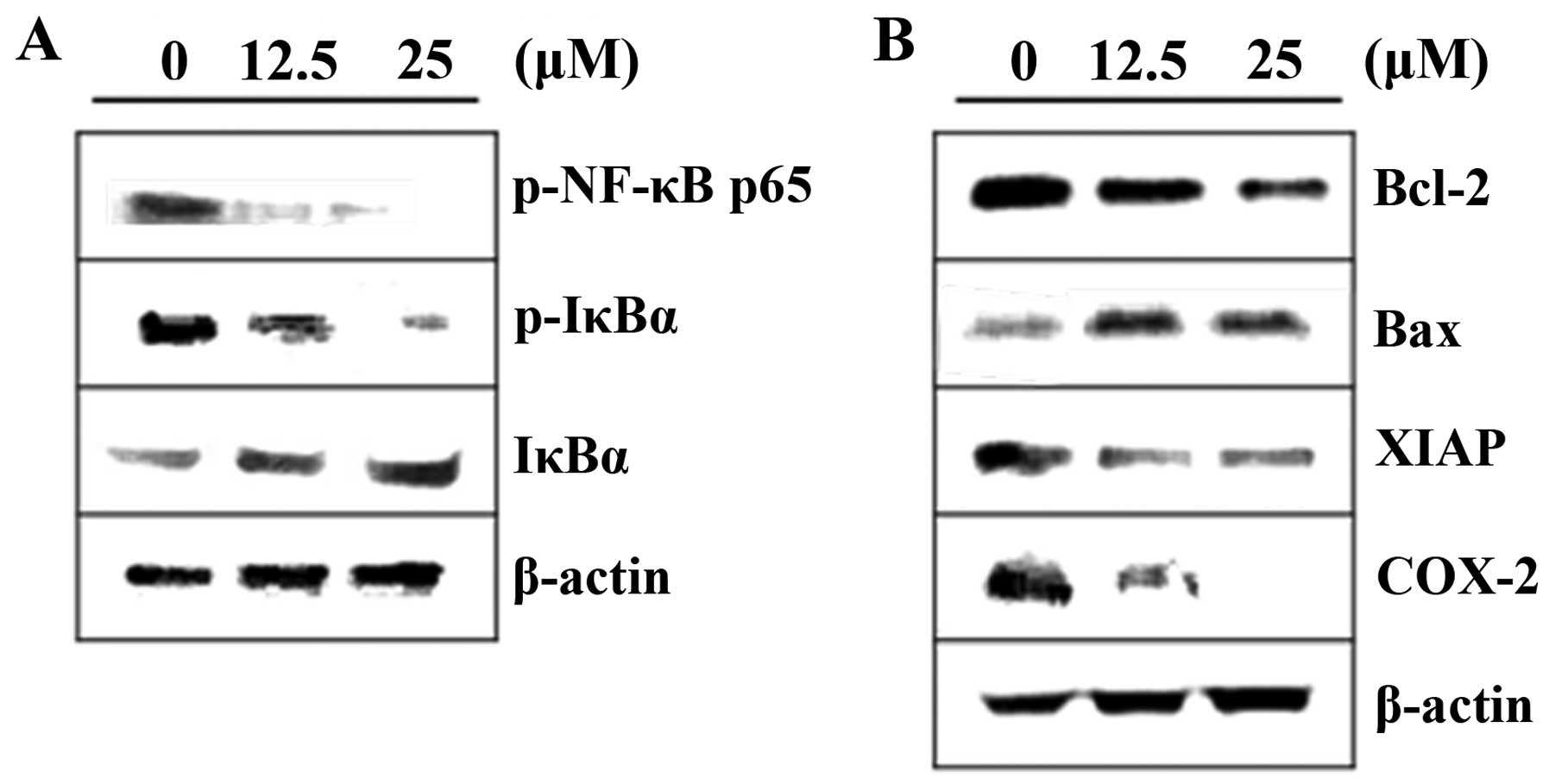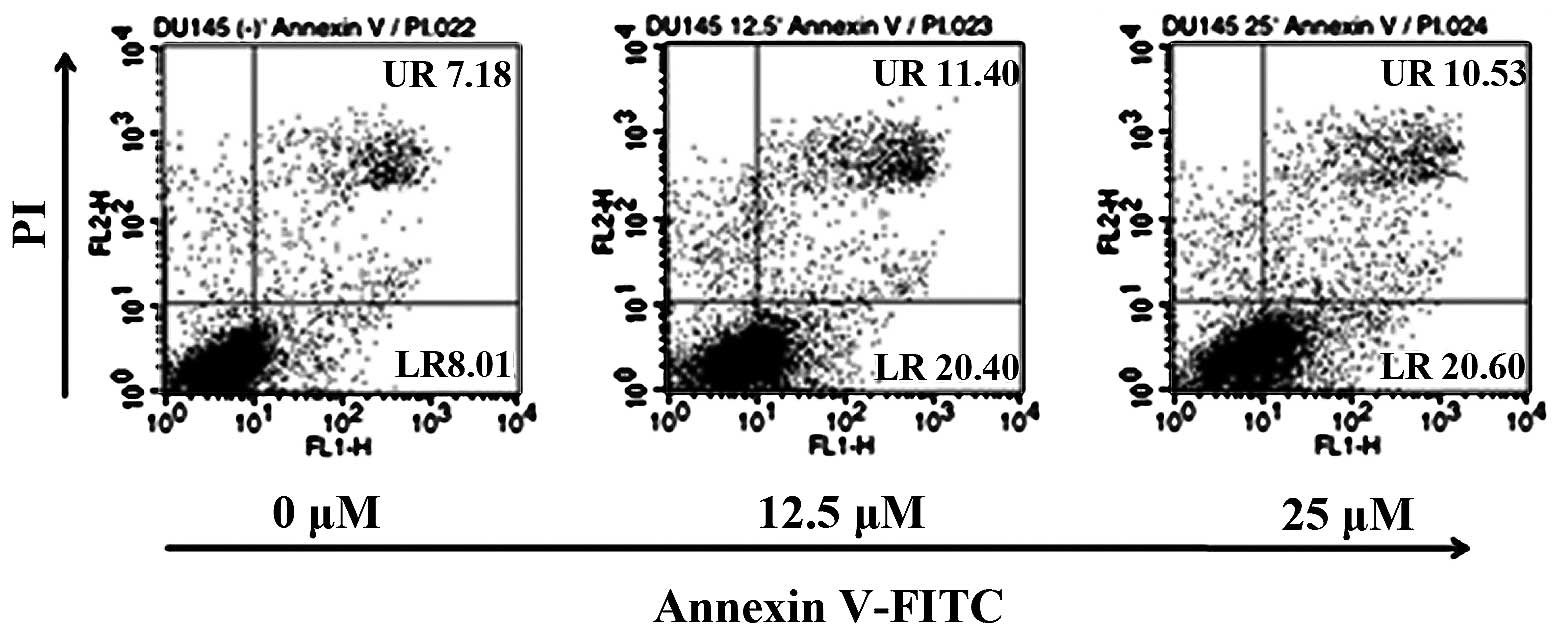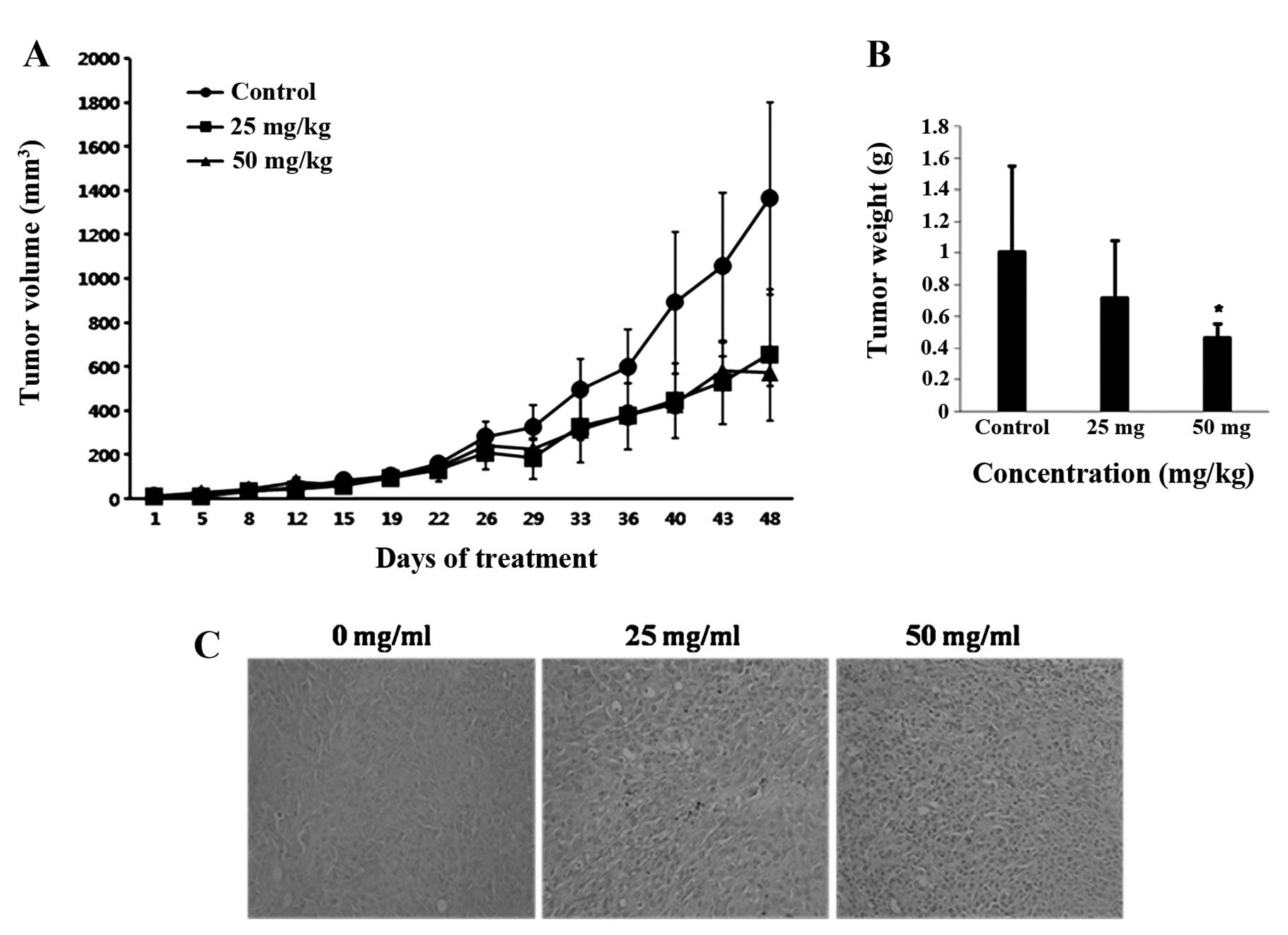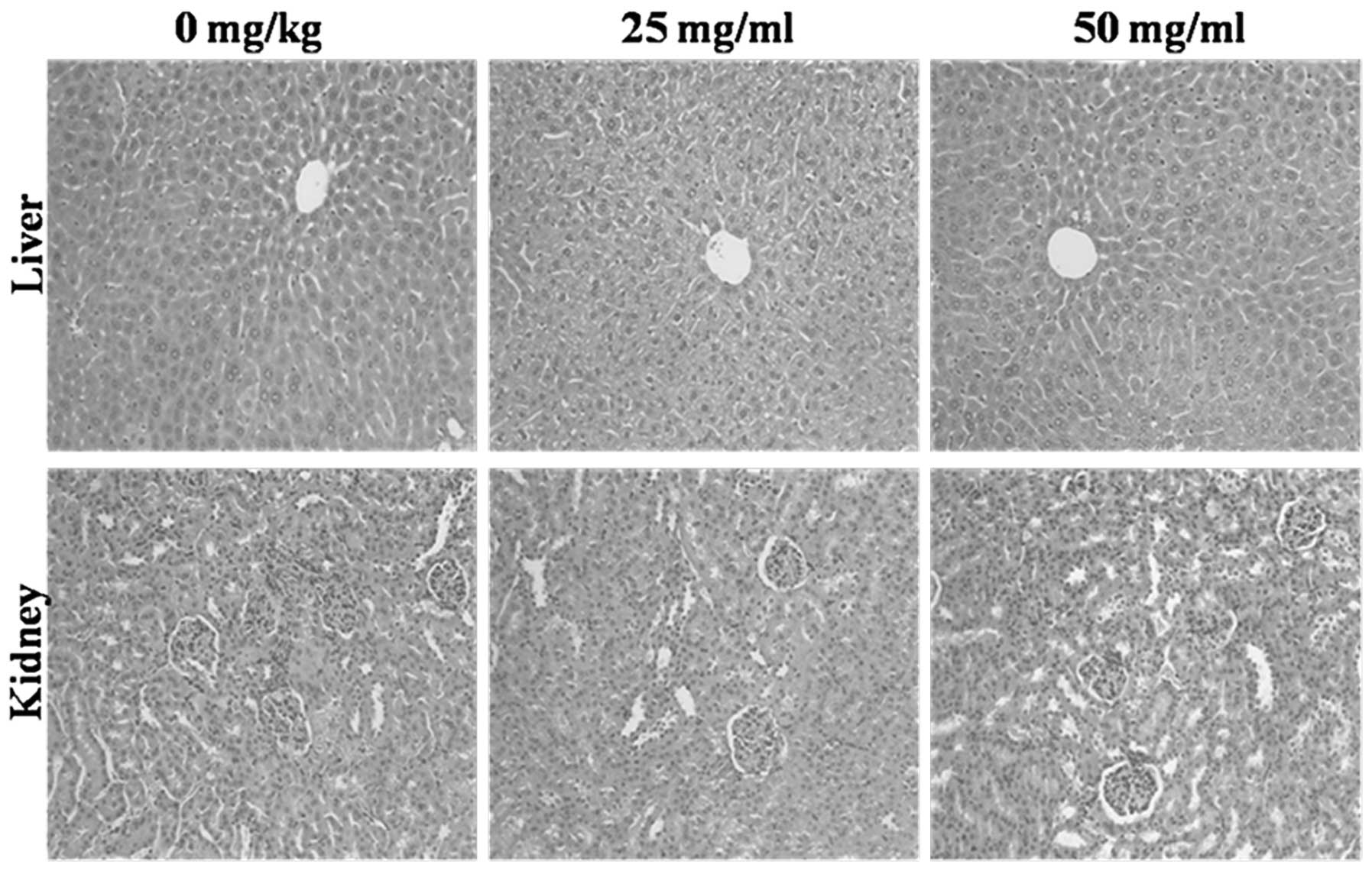|
1
|
Jemal A, Bray F, Center MM, Ferlay J, Ward
E and Forman D: Global cancer statistics. CA Cancer J Clin.
61:69–90. 2011. View Article : Google Scholar
|
|
2
|
Siegal R, Naishadham D and Jemal A: Cancer
statistics, 2012. CA Cancer J Clin. 62:10–29. 2012. View Article : Google Scholar
|
|
3
|
Kar S, Palit S, Ball WB and Das PK:
Carnosic acid modulates Akt/IKK/NF-κB signaling by PP2A and induces
intrinsic and extrinsic pathway mediated apoptosis in human
prostate carcinoma PC-3 cells. Apoptosis. 17:735–747.
2012.PubMed/NCBI
|
|
4
|
Kim EJ, Lim SS, Park SY, Shin HK, Kim JS
and Park JH: Apoptosis of DU145 human prostate cancer cells induced
by dehydrocostus lactone isolated from the root of Saussurea
lappa. Food Chem Toxicol. 46:3651–3658. 2008. View Article : Google Scholar : PubMed/NCBI
|
|
5
|
Linja MJ, Savinainen KJ, Saramäki OR,
Tammela TL, Vessella RL and Visakorpi T: Amplification and
overexpression of androgen receptor gene in hormone-refractory
prostate cancer. Cancer Res. 61:3550–3555. 2001.PubMed/NCBI
|
|
6
|
Lam JS, Leppert JT, Vemulapalli SN,
Shvarts O and Belldegrun AS: Secondary hormonal therapy for
advanced prostate cancer. J Urol. 175:27–34. 2006. View Article : Google Scholar : PubMed/NCBI
|
|
7
|
Liu LZ, Jing Y, Jiang LL, et al: Acacetin
inhibits VEGF expression, tumor angiogenesis and growth through
AKT/HIF-1α pathway. Biochem Biophys Res Commun. 413:299–305.
2011.PubMed/NCBI
|
|
8
|
Singh RP, Agrawal P, Yim D, Agarwal C and
Agarwal R: Acacetin inhibits cell growth and cell cycle
progression, and induces apoptosis in human prostate cancer cells:
structure-activity relationship with linarin and linarin acetate.
Carcinogenesis. 26:845–854. 2005. View Article : Google Scholar
|
|
9
|
Schuier M, Sies H, lllek B and Fischer H:
Cocoa-related flavonoids inhibit CFTR-mediated chloride transport
across T84 human colon epithelia. J Nutr. 135:2320–2325.
2005.PubMed/NCBI
|
|
10
|
Miyazawa M and Hisama M: Antimutagenic
activity of flavonoids from Chrysanthemum morifolium. Biosci
Biotechnol Biochem. 67:2091–2099. 2003. View Article : Google Scholar : PubMed/NCBI
|
|
11
|
Martínez-Vázquez M, RamírezApan TO, Lastra
AL and Bye R: A comparative study of the analgesic and
anti-inflammatory activities of pectolinarin isolated from
Cirsium subcoriaceum and linarin isolated from Buddleia
cordata. Planta Med. 64:134–137. 1998.PubMed/NCBI
|
|
12
|
Kraft C, Jenett-Siems K, Siems K, et al:
In vitro antiplasmodial evaluation of medicinal plants from
Zimbabwe. Phytother Res. 17:123–128. 2003. View Article : Google Scholar : PubMed/NCBI
|
|
13
|
Cholbi MR, Paya M and Alcaraz MJ:
Inhibitory effects of phenolic compounds on CC14-induced micresomal
lipid peroxidation. Experientia. 47:195–199. 1991. View Article : Google Scholar
|
|
14
|
Yin Y, Gong FY, Wu XX, et al:
Anti-inflammatory and immunosuppressive effect of flavones isolated
from Artemisia vestita. J Ethnopharmacol. 120:1–6. 2008.
View Article : Google Scholar : PubMed/NCBI
|
|
15
|
Fong Y, Shen KH, Chiang TA and Shih YW:
Acacetin inhibits TPA-induced MMP-2 and u-PA expressions of human
lung cancer cells through inactivating JNK signaling pathway and
reducing binding activities of NF-kappaB and AP-1. J Food Sci.
75:H30–H38. 2010. View Article : Google Scholar
|
|
16
|
Shen KH, Hung SH, Yin LT, et al: Acacetin,
a flavonoid, inhibits the invasion and migration of human prostate
cancer DU145 cells via inactivation of the p38 MAPK signaling
pathway. Mol Cell Biochem. 333:279–291. 2010. View Article : Google Scholar : PubMed/NCBI
|
|
17
|
Hsu YL, Kuo PL and Lin CC: Acacetin
inhibits the proliferation of Hep G2 by blocking cell cycle
progression and inducing apoptosis. Biochem Pharmacol. 67:823–829.
2004. View Article : Google Scholar : PubMed/NCBI
|
|
18
|
Park MH, Choi MS, Kwak DH, et al:
Anti-cancer effect of bee venom in prostate cancer cells through
activation of caspase pathway via inactivation of NF-κB. Prostate.
71:801–812. 2011.PubMed/NCBI
|
|
19
|
Xiao G, Harhaj EW and Sun SC:
NF-kappaB-inducing kinase regulates the processing of NF-kappaB2
p100. Mol Cell. 7:401–409. 2001. View Article : Google Scholar : PubMed/NCBI
|
|
20
|
Senftleben U, Cao Y, Xiao G, et al:
Activation by IKKalpha of a second, evolutionary conserved,
NF-kappa B signaling pathway. Science. 293:1495–1499. 2001.
View Article : Google Scholar : PubMed/NCBI
|
|
21
|
Liu YQ, Hu XY, Lu T, et al: Retigeric acid
B exhibits antitumor activity through suppression of nuclear
factor-κB signaling in prostate cancer cells in vitro and in vivo.
PLoS One. 7:e380002012.PubMed/NCBI
|
|
22
|
Baldwin AS: Control of oncogenesis and
cancer therapy resistance by the transcription factor NF-kappaB. J
Clin Invest. 107:241–246. 2001. View
Article : Google Scholar : PubMed/NCBI
|
|
23
|
Chen CD and Sawyers CL: NF-kappa B
activates prostate-specific antigen expression and is upregulated
in androgen-independent prostate cancer. Mol Cell Biol.
22:2862–2870. 2002. View Article : Google Scholar : PubMed/NCBI
|
|
24
|
Palayoor ST, Youmell MY, Calderwood SK,
Coleman CN and Price BD: Constitutive activation of IkappaB kinase
alpha and NF-kappaB in prostate cancer cells is inhibited by
ibuprofen. Oncogene. 18:7389–7394. 1999. View Article : Google Scholar : PubMed/NCBI
|
|
25
|
Boreddy SR, Pramanik KC and Srivastava SK:
Pancreatic tumor suppression by benzyl isothiocyanate is associated
with inhibition of PI3K/AKT/FOXO pathway. Clin Cancer Res.
17:1784–1795. 2011. View Article : Google Scholar : PubMed/NCBI
|
|
26
|
Kaur P, Shukla S and Gupta S: Plant
flavonoid apigenin inactivates Akt to trigger apoptosis in human
prostate cancer: an in vitro and in vivo study. Carcinogenesis.
29:2210–2217. 2008. View Article : Google Scholar : PubMed/NCBI
|
|
27
|
Manning BD and Cantley LC: AKT/PKB
signaling: navigating downstream. Cell. 129:1261–1274. 2007.
View Article : Google Scholar : PubMed/NCBI
|
|
28
|
Sizemore N, Leung S and Stark GR:
Activation of phosphatidylinositol 3-kinase in response to
interleukin-1 leads to phosphorylation and activation of the
NF-kappaB p65/RelA subunit. Mol Cell Biol. 19:4798–4805.
1999.PubMed/NCBI
|
|
29
|
Meng F, Liu L, Chin PC and D’Mello SR: Akt
is a downstream target of NF-kappa B. J Biol Chem. 277:29674–29680.
2002. View Article : Google Scholar : PubMed/NCBI
|
|
30
|
Bruckheimer EM and Kyprianou N: Apoptosis
in prostate carcinogenesis. A growth regulator and a therapeutic
target. Cell Tissue Res. 301:153–162. 2000. View Article : Google Scholar : PubMed/NCBI
|
|
31
|
Pan MH, Lai CS, Hsu PC and Wang YJ:
Acacetin induces apoptosis in human gastric carcinoma cells
accompanied by activation of caspase cascades and production of
reactive oxygen species. J Agric Food Chem. 53:620–630. 2005.
View Article : Google Scholar : PubMed/NCBI
|
|
32
|
Talib WH and Mahasneh AM:
Antiproliferative activity of plant extracts used against cancer in
traditional medicine. Sci Pharm. 78:33–45. 2010. View Article : Google Scholar : PubMed/NCBI
|
|
33
|
Franke TF, Yang SI, Chan TO, et al: The
protein kinase encoded by the Akt proto-oncogene is a target of the
PDGF-activated phosphatidylinositol 3-kinase. Cell. 81:727–736.
1995. View Article : Google Scholar : PubMed/NCBI
|
|
34
|
Vivanco I and Sawyers CL: The
phosphatidylinositol 3-kinase AKT pathway in human cancer. Nat Rev
Cancer. 2:489–501. 2002. View
Article : Google Scholar : PubMed/NCBI
|
|
35
|
Song L, Xiong H, Li J, et al: Sphingosine
kinase-1 enhances resistance to apoptosis through activation of
PI3K/Akt/NF-κB pathway in human non-small cell lung cancer. Clin
Cancer Res. 17:1839–1849. 2011.PubMed/NCBI
|
|
36
|
Ghosh S, May MJ and Kopp EB: NF-κB and Rel
proteins: evolutionarily conserved mediators of immune responses.
Annu Rev Immunol. 16:225–260. 1998.
|
|
37
|
Barkett M and Gilmore TD: Control of
apoptosis by Rel/NF-kappaB transcription factors. Oncogene.
69:6910–6924. 1999. View Article : Google Scholar : PubMed/NCBI
|
|
38
|
Karin M and Lin A: NF-kappaB at the
crossroads of life and death. Nat Immunol. 3:221–227. 2002.
View Article : Google Scholar : PubMed/NCBI
|
|
39
|
Carneiro ML, Peixoto RC, Joanitti GA, et
al: Antitumor effect and toxicity of free rhodium (II) citrate and
rhodium (II) citrate-loaded maghemite nanoparticles in mice bearing
breast cancer. J Nanobiotechnology. 11:42013. View Article : Google Scholar : PubMed/NCBI
|















